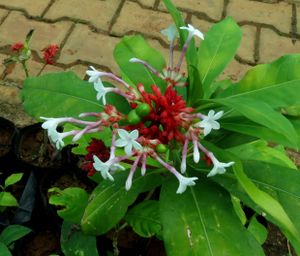Note: This is a project under development. The articles on this wiki are just being initiated and broadly incomplete. You can Help creating new pages.
Difference between revisions of "Rauvolfia serpentina - Sarpa Gandha"
Chaithrika (talk | contribs) (+Common names) |
m (Prabhakar moved page Sarpa Gandha to Sarpa Gandha (Rauvolfia serpentina)) |
(No difference)
| |
Revision as of 15:44, 29 March 2018
Rauvolfia serpentina [1], or Indian snakeroot is a species of flower in the family Apocynaceae. It is native to the Indian subcontinent and East Asia (from India to Indonesia).Common English names include devil pepper and snakeroot.
Medicinal uses
The extract of the plant has been used for millennia in India – Alexander the Great administered this plant to cure his general Ptolemy I Soter of a poisoned arrow.[citation needed] It was reported that Mahatma Gandhi took it as a tranquilizer during his lifetime. It has been used to treat insect stings and the bites of venomous reptiles.[citation needed] The plant also contains reserpine, was used to treat high blood pressure and mental disorders including schizophrenia, and had a brief period of popularity for that purpose in the West from 1954 to 1957. R. serpentina is also known for its antimicrobial, antifungal, anti-inflammatory, antiproliferative, antidiuretic and anticholinergic activities.
Hyper tension, insomnia.
Recent research has proved that Rauwolfia serpentina exhibits activity against drug-resistant tumor cells.
It is one of the 50 fundamental herbs used in traditional Chinese medicine, where it has the name shégēn mù (Chinese: 蛇根木) or yìndù shémù (Chinese: 印度蛇木).
Common name
- English - serpentine wood
- Kannada - ಸರ್ಪಗಂಧಿ
- Hindi - चंद्रभाग
